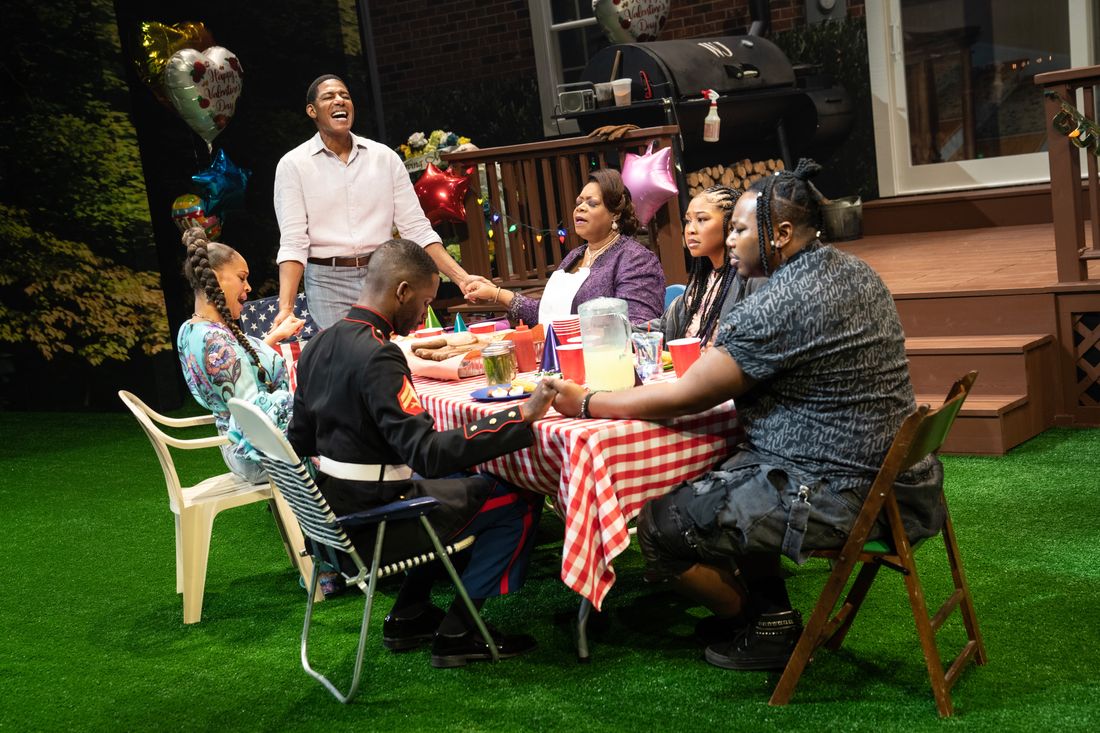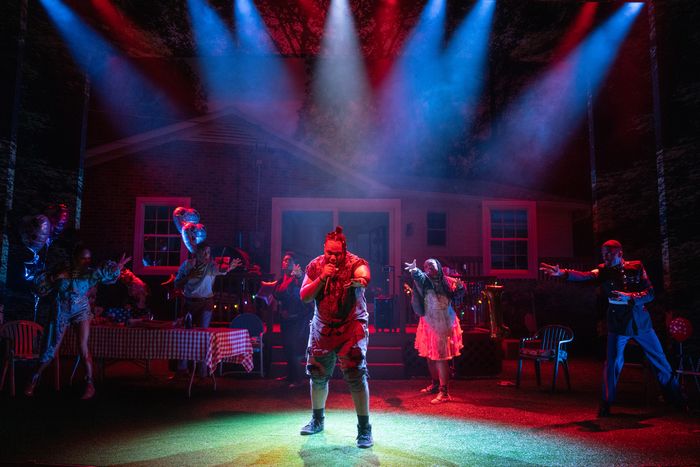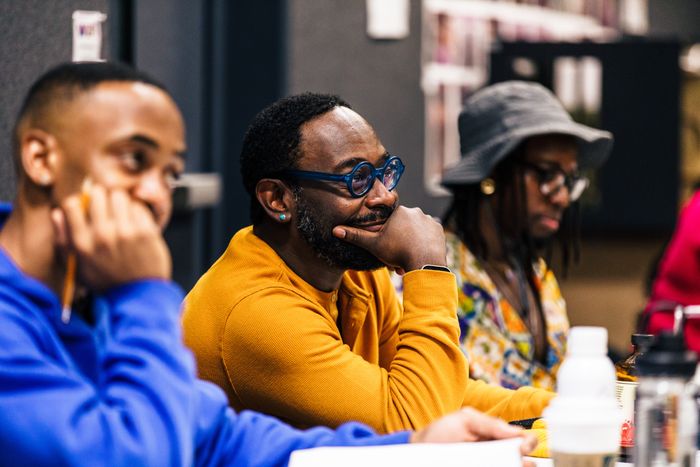
Fat Ham wants you to talk. It begins abruptly, and sans disclaimer, with a character watching OnlyFans on his phone. From that point on, the audience is aware: This is not the space for inhibition. Here, shouting “Kiss!” at characters during tense confessional scenes is the norm, and dialogue between audience and actors is encouraged. The play is a Black, queer adaptation of Hamlet by James Ijames, a Philadelphia-based actor turned playwright making his Broadway debut with Fat Ham following a sold-out showing at the Public; it won the Pulitzer Prize for Drama last spring, three days before beginning Off Broadway previews.
The show follows our Hamlet, now named Juicy (Marcel Spears), whose father’s ghost, here known as Pap (Billy Eugene Jones), has come back to ask him to kill his uncle, Rev (also Jones), at his mother Tedra (Nikki Crawford) and Rev’s wedding party. Also present is Rabby (Benja Kay Thomas), a gender-swapped, church-going Polonius, and her children, Opal (Adrianna Mitchell) and Larry (Calvin Leon Smith), who may be our Ophelia and Laertes, respectively, but whose romantic inclinations lean differently than the characters they represent. And the porn-watcher is Tio (Chris Herbie Holland), a bolder and brasher (and funnier) Horatio.
Its broad plot beats mirror Hamlet, but Fat Ham has no rigid adherence to the original. Much of the tension is now built on the fearful homophobia that Rev, Juicy’s uncle, projects onto him, and the show ends not in total tragedy but with a musical drag performance. What is taken from Shakespeare instead is disavowal of the fourth wall in hopes of creating a responsive, unrestrained audience. “I think, How many things can I throw in their direction?” Ijames says. “It’s not surgical; it’s a sledgehammer.”
In the broadest terms, what is the project of Fat Ham?
Fat Ham is using the archaic form of the Shakespearean play to offer an audience a space to reconsider what they want their life to look like, and giving some people permission to be more themselves. It’s using the tragic form, which has all these rules attached to it, to offer people access to liberation. When the end of the show happens and everybody’s on their feet, there’s something churning. I grew up wanting to be a preacher, and this has felt the closest to touching people, showing them something they hadn’t seen or considered. The project of the play is creating space for joy and transformation.
You called Shakespeare an archaic form. Why is it worth reinvigorating?
I don’t mean that in a bad way. I mean that in the sense that it is old. We don’t speak that way anymore. Sometimes people don’t feel like they have access to those stories because they don’t sound the way we sound, or because there’s holiness to them. So how do you bring those stories closer to a contemporary audience beyond doing, say, Hamlet in the ’20s with flappers?
The first Shakespearean play I read was Julius Caesar in middle school, and I would talk about it constantly. There was something about that domestic scene between Brutus and his wife in the middle of this big political play that stayed with me. Those plays have always been intriguing to me, but I wasn’t allowed into them. I did graduate from school for acting, and that reaffirmed the things I was afraid of with Shakespeare. When I started to write Fat Ham, leading up to the 2016 election, I realized Hamlet is mine, too.
Why did you feel distanced from Shakespeare initially?
Some of it was how it was taught to me. In middle- and high school, it was strictly literary. I went to Morehouse, a historically Black college, where it wasn’t central. They were more interested in the Greeks than they were with Shakespeare. In grad school, at Temple University, it had to do with the professors’ personal assessment of me in that program — how they talked to me about my performance of Shakespeare told me that wasn’t something I should be doing.
What were their reasons?
I’m from the South, and they would talk about my regionalism being in the way. I was like, I don’t have that thick of an accent. One person said that my default was to move to rage.
That sounds racially coded.
Super-coded, right? I don’t think they even realized how coded. And I didn’t realize how coded it was. I’d only done one Shakespeare as a professional actor, because I would get those auditions and say, I can’t do it. I did Romeo and Juliet in 2010 at the Arden Theatre, in Philly, and had a blast.
Who did you play?
Benvolio. I’m perpetually Benvolio — levelheaded, kind, wants everybody to get along. Middle-child energy. In Hamlet, I would be Horatio.
That’s opposed to the rage your teachers were invoking.
Which is what was interesting. When I found myself in the world as an actor, what I was being called in for was different from what I was being typecast into when I was in graduate school. It was all very coded, but I didn’t know what the code was, so I just assumed I was deficient. It made me keep my distance from it.
As a playwright, I’m self-taught. I went back to those plays and I thought, They’re so great. The more I spent time with them, the more I realized Shakespeare is a lot like me. He wanted to write something that was going to appeal to as many people as possible, that was going to be about entertainment, but was going to have gravitas and weight.
Why adapt Hamlet specifically?
It allowed me to talk about something I was teasing out for myself: When you inherit a cycle of familial trauma, do you want to continue that? Do you buy into abuse or alcoholism? What is your relationship to what you’ve inherited that’s now a part of your DNA? When I was looking at Hamlet, I thought, He has a choice of whether to continue what his family has done.
Hamlet is conflicted about the decision that he makes to seek vengeance. I was like, What if he didn’t?
The thing that happens in Fat Ham — and the thing I would do if I was in Hamlet’s shoes and a ghost showed up to me — is I would go to my mother. We’d have to work through the ghost bit, but ultimately my mother would go, “Okay, let’s figure out what’s actually going on.” I wanted a Hamlet that would make that choice but would try out some other options along the way. The Fortinbras story line launched me to change the ending. I felt like, This is history repeating itself. I’m coming to avenge my father while you’re here, avenging your father. There’s no space for forgiveness or transformation or something different to happen.
The relationship between the son and the mother in Hamlet often gets played as Oedipal. Here, you have a queer son who has a mother-son bond that queer boys often have with their mothers, which is intimate in a different way. How did you go about adapting that relationship?
In Shakespeare’s Hamlet, it is definitely uncomfortable. I knew I didn’t want to do that.
Sometimes in my friends’ relationships with their mothers, and my students’ relationships with their parents, there are mothers who will make their sons their person. It becomes, I need you to be the person I confide in. I wanted to write a relationship between my Hamlet and Gertrude that looked like that. It feels uncomfortable because she can’t expect him to be her whole world. But she does. I wanted to illustrate that there are mothers who have queer children and become fiercely protective, but then that transforms into something else as that child grows out of needing protection.
In drama, to have a release of joy you have to have tension beforehand. How do you think about writing the tension without replicating Black trauma?
Part of it is that the problems that the people are having aren’t systemic — they’re about each other. I don’t like that you married my father’s brother. I don’t like that you speak in a way I don’t understand. Anybody can experience that. The tension is people stuff. It’s not, “I want to get a job, but I can’t because I was incarcerated, and I was incarcerated because of a petty drug crime I did when I was 16.” It’s also a play that is largely devoid of the white gaze. The racial power dynamic isn’t present. I don’t explain Blackness to the audience. If you don’t understand a thing that’s happening, you have to put it together in the same way I would if I saw Dancing at Lughnasa. There’s stuff in that story I won’t readily understand, but I can enjoy what I’m experiencing. It’s asking audiences no matter their ethnic or racial background to do that, while Black people can just be in the space.
How do you remove the white gaze from Shakespeare?
The gaze is about how one experiences the thing versus the source material. Let’s use Kehinde Wiley: The structure of those paintings is classical European portraiture, but when I look at them, it is undeniably trying to say to me, You’re beautiful, you’re interesting, you’re sexy. Just the structure of the story itself doesn’t have a racialized lens to it.
The intervention that Fat Ham is doing is not just with the script but with the show’s relationship to the audience. How did the Elizabethan tradition influence that relationship?
It was kings, queens, nobles, and everybody else all in the same space — a weirdly democratic bubble inside of the larger structure of that society. If they didn’t like it, then it was tomato, tomato, tomato. There was no sense of the audience being a manicured thing. It was a crowd. Something I think about with all of my plays is: How do you speak to this unknowable mass and elicit something in conversation with what’s onstage? I think about the vertical relationship between the performance and the audience as individuals. Each person has a relationship to what’s onstage. There’s also a horizontal relationship between other audience members: You just laughed at that, but I don’t know why you laughed at that. So now I am in conversation with what you’re feeling about the play. I think about how I can hit one person in a way that’s going to have a ripple effect through a lot of different people.
It’s been interesting being in previews, because I’m manicuring it now. I’m listening to the audience. How can I gather as many people as possible around this to have an experience together? That’s what Shakespeare did. Those audiences were experiencing things that were magnificent, and they were engaging with them as if they were watching Love Island.
This was perhaps the most responsive audience I’ve ever been in on Broadway. How do you signal it’s okay to respond?
Director Saheem Ali is extremely good at being able to telegraph to the audience, You can have a good time; it’s your voice we want. When you walk in there’s no preshow music. You become comfortable with the sound of audience in the space.
I’m not afraid of taking sharp turns, and that elicits vocal responses from people. There’s this moment where Juicy does something really awful to the character Larry, and then Larry retaliates. But we don’t expect him to. The audience gasps. I sit in the box a lot so I can watch the audience — I haven’t watched the stage at that moment for maybe a week. Every single time it’s like they’re watching a horror movie.
How do you get an audience that has been historically excluded from Broadway to feel welcome at your show?
You invite them. You make them feel like they have space. I’ve been paying attention to see if there’s a night when people are not talking to each other, and it hasn’t happened yet. People want to feel like they can kick back and be themselves. The show is giving people permission to do that in the experience of Juicy suddenly looking at you and saying, “What do you think?” Now, you’re like, “Oh, I actually can be responsive to this, because he’s asking me questions. He wants to know what I think, and how do I tell ’em what I think? I laugh, I cry. I go, uh-oh.” That starts to happen the moment they realize that there is no fourth wall.
Why don’t you like the fourth wall?
It’s just not as fun. Having no fourth wall allows the world to be bigger. There’s a set of plays where it works really well. Most of Chekhov is great, even though one could make the case that there’s no fourth wall in Chekhov. Ibsen for sure. A Streetcar Named Desire needs the safety of being behind the fourth wall because it goes to some really awful places. So you need that protection.
But there’s no fourth wall in Shakespeare, and there’s no fourth wall in the Greeks. It’s not as common as we pretend it is, even though we have all these theaters that are built for plays that have four walls. Saying I don’t like the fourth wall is me being in line with the vast majority of theatrical history.
You won a Pulitzer before premiering your show live for the majority of the audiences that have seen it. What does the Pulitzer mean to you?
When I went to the ceremony, I sat beside Viet Thanh Nguyen, who wrote The Sympathizer and was on the committee. He was saying, “It just made me laugh so much.” The Pulitzer does all sorts of wonderful things to give you more visibility; it certainly is affirmation of what you’ve been doing. But knowing that other writers thought that my writing was of a high quality — that meant a lot to me.
What did it do to you as an artist who still had to go through two rounds of previews?
It froze me a bit. But then I was like, wake up! I don’t feel it so much now, but at the time, there was a real sense of Oh God, I hope the people like it. There’s new stuff in this iteration that I was afraid to do before. When Pap’s ghost comes back, I turned it into a moment where Juicy is talking to Tedra about seeing Pap, but Tedra can’t see him. He turns to us and is like, Do you see him? It brings three levels of communication together: the character to character, the character to the past of the play, and then the character to audience.
It’s also made me more ambitious with what the next three things that I write are going to look like. I’m asking, If I really push myself, what do the plays start to look like for me?
In which direction do you want to push yourself?
Scale. I want to build plays where the world is bigger. I don’t know that I’ve written very many plays that move from place to place with a Tony Kushner-ian sweep. I’d love to do that.
I’ve wanted to write a play for a while where there’s characters in it that speak a language that doesn’t exist. And that’s really difficult, because then you have to imagine one. You can’t just slam your hands on the computer.
You’ve got to go full Tolkien.
You’ve got to go full Tolkien. I love comic books and sci-fi. I’m working on a play now that I’m hoping will feel like horror. It’s about artificial intelligence and implicit bias. I’m trying to figure out how that genre can work onstage and make people uneasy.
This interview has been edited and condensed.







